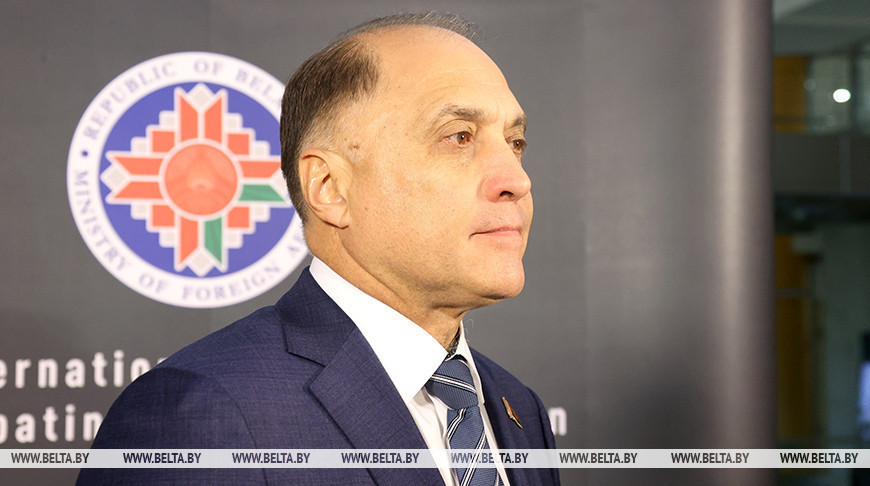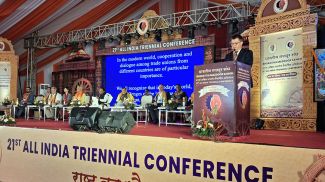
MINSK, 15 November (BelTA) - Western neighbors of Belarus are unwilling to address the issues related to the rising scale of illegal migration, State Secretary of the Security Council of Belarus Aleksandr Volfovich said at the international conference in Minsk to discuss regional cooperation in combating illegal migration, BelTA has learned.
“Western neighbors are unwilling to solve the issues accumulating in this area. They see the construction of fences as an alternative to find ways out of this situation. They think it will help them stop the flow of refugees and migrants. The self-centered migration policies of Poland and the Baltic states have also led to unprecedented violence against migrants at the border,” the state secretary said. “Unfortunately, diplomats of Belarus' neighboring countries, such as Poland and the Baltic states, who are blaming Belarus for encouraging illegal migration, are not present here [at the conference].”
According to him, Belarus is making every effort to reduce the tensions, but the effect can only be achieved in close cooperation with neighboring countries and the world community in general.
“The world is gradually turning into a ground for global confrontation.
There is not a single area of international and regional security free from confrontation and tension. Millions of ordinary citizens suffer and are forced to leave their homes and countries in search of a better life abroad. Illegal migration has long ago turned from a side issue into a global challenge,” Aleksandr Volfovich said.
Among the conditions for the growth of illegal migration is growing economic inequality between countries, aggravation of inter-ethnic and inter-confessional contradictions, escalation of political tension. The problem is aggravated by the inadequate policies of individual countries and sometimes the indifference of international organizations. In addition, there are risks associated with drug trafficking, arms smuggling, human trafficking, extremism and terrorism.
According to Aleksandr Volfovich, the Western sanctions against Belarus do not contribute to joint effective work in this area either. “We are convinced that the current situation calls for the development of a more effective and transparent system to resolve a wide range of illegal migration issues in the Eurasian region,” he said. Such a system should be based on international law and its institutions.
The state secretary of the Security Council addressed his colleagues from Poland, the Baltic states and other European countries: “Belarus is open to dialogue on the whole range of issues related to regional and international security”.
“Belarus is open to dialogue on the whole range of issues related to regional and international security,” the state secretary said.
“Western neighbors are unwilling to solve the issues accumulating in this area. They see the construction of fences as an alternative to find ways out of this situation. They think it will help them stop the flow of refugees and migrants. The self-centered migration policies of Poland and the Baltic states have also led to unprecedented violence against migrants at the border,” the state secretary said. “Unfortunately, diplomats of Belarus' neighboring countries, such as Poland and the Baltic states, who are blaming Belarus for encouraging illegal migration, are not present here [at the conference].”
According to him, Belarus is making every effort to reduce the tensions, but the effect can only be achieved in close cooperation with neighboring countries and the world community in general.
“The world is gradually turning into a ground for global confrontation.
There is not a single area of international and regional security free from confrontation and tension. Millions of ordinary citizens suffer and are forced to leave their homes and countries in search of a better life abroad. Illegal migration has long ago turned from a side issue into a global challenge,” Aleksandr Volfovich said.
Among the conditions for the growth of illegal migration is growing economic inequality between countries, aggravation of inter-ethnic and inter-confessional contradictions, escalation of political tension. The problem is aggravated by the inadequate policies of individual countries and sometimes the indifference of international organizations. In addition, there are risks associated with drug trafficking, arms smuggling, human trafficking, extremism and terrorism.
According to Aleksandr Volfovich, the Western sanctions against Belarus do not contribute to joint effective work in this area either. “We are convinced that the current situation calls for the development of a more effective and transparent system to resolve a wide range of illegal migration issues in the Eurasian region,” he said. Such a system should be based on international law and its institutions.
The state secretary of the Security Council addressed his colleagues from Poland, the Baltic states and other European countries: “Belarus is open to dialogue on the whole range of issues related to regional and international security”.
“Belarus is open to dialogue on the whole range of issues related to regional and international security,” the state secretary said.













